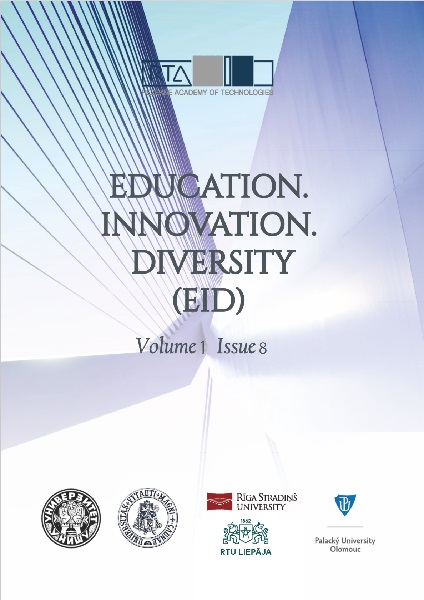SOCIAL- EMOTIONAL LEARNING IN THEATER ART CLASSES IN SCHOOL EDUCATION
DOI:
https://doi.org/10.17770/eid2024.1.7940Keywords:
drama methods, creative drama, project “Skola 2030”, social-emotional learning, theater artAbstract
This article is a theoretical study that explores the concept of social-emotional learning in the context of Theatre Arts lessons in Latvian school education. In the last decades, the belief that it is not enough for the student to acquire factual knowledge only has been strengthened. The concept of social-emotional learning was created 20 years ago and has only now been introduced into Latvian educational guidelines. The study aims to establish a theoretical basis for the possibility of implementing effective social-emotional learning in Theatre Art lessons by developing social-emotional skills in students such as self-regulation, independent thinking, cooperation, and social awareness. The results certify that social-emotional learning fits organically into Theatre Arts and teachers’ awareness of teaching social-emotional skills is of great importance in this process.
References
Agliati, A., Aguilar Barriga, P., Álvarez Cifuentes, P... & Valverde Jiménez, B. (2020). Handbook: Methodological techniques for assessing students' social-emotional skills at school. Retrieved from https://www.visc.gov.lv/sites/visc/files/data_content/rokasgramata_met_pan_sem1.pdf
Auziņš, A. (2019). No huligānisma līdz mākslai. Izšķirošais ir vēstījums. Retrieved from https://www.skola2030.lv/lv/jaunumi/blogs/no-huliganisma-lidz-makslai-izskirosais-ir-vestijums
Bērziņa, S., Martinsone, B., & Niedre, R. (n.d.). Sociāli emocionālā mācīšanās. Nodarbību plāni 1.–12. klasei. Skola2030 metodiskais līdzeklis. Retrieved from https://mape.skola2030.lv/resources/12532
European Commision. (2020). Education and Training Monitor 2020, Country analys. Directorate- general for Education, Youth, Sport and Culture. Retrieved from https://pmb.cereq.fr/doc_num.php?explnum_id=8273
CASEL. (n.d). Fundamentals odf SEL. Retrieved from https://casel.org/fundamentals-of-sel/
Cash, R. M. (2018). Boost Social- Emotional Learning with Creative Dramatics. Retrieved from https://freespiritpublishingblog.com/2018/04/17/boost-social-emotional-learning-with-creative-dramatics/
Elias, M.J. (2003). Academic and social-emotional learning. The International Academy of Education. Retrieved from http://www.iaoed.org/downloads/prac11e.pdf
Engere, I., Gleške, L., Kvjatkovska I., & Šulce, D. (2014). Lomu spēles sociālpedagoģiskajā darbā. Rīga: Aisma.
Greenberg, M. T. (2023). Evidence for social and emotional learning in schools. Learning Policy Institute. DOI: https://doi.org/10.54300/928.269
Goulmens, D. (2001). Tava Emocionālā intelligence. Rīga: Jumava.
Iddon, C. (2022). Benefits of Creative Drama Techniques. Retrieved from https://study.com/learn/lesson/creative-drama-techniques-examples.html
Kraģis, I. (2023). Teātra māksla 4.-6. klasei. Rīga: Zvaigzne ABC.
Kriezi, I. (2023). Exploring Opportunities for Social and Emotional Learning in Drama Classes. Retrieved from https://urn.fi/URN:NBN:fi:oulu-202311213258
Krišāne, I., Niedre, I., & Smildziņa, L. (n.d.). Teātra māksla 1.-9. klasei. Mācību priekšmeta programmas paraugs. Valsts izglītības satura centrs. Retrieved from https://mape.gov.lv/catalog/materials/5756B160-ADEE-4C38-A821-91F827F839FF/view
Raščevska, M., Raževa, A., Martinsone, B, Tūbele, S., Vucenlazdāns, P., & Vazne, Ž. (2012). Skolotāju aptaujas par skolēnu mācīšanās darbību un uzvedību (SASMDU) ticamība un validitātes. Rīga: Latvijas Universitāte
Riazoglu, F. (2006). Bringing Life to EFL Classes by Creative Drama. Creative Drama Journal, 116. Retrieved from https://dergipark.org.tr/tr/download/article-file/145066
Schiller, J. (2008). Drama For At-Risk Students: A Strategy For Improving Academic and Social Skills AmongPublic Middle School Students. School of Education. Dominican University of California. San Rafael, CA. Retrieved from https://files.eric.ed.gov/fulltext/ED502068.pdf
Martinsone, B., & Niedre, R. (2013). Sociāli emocionālā audzināšana. Rokasgrāmata. Rīga.
Martinsone, B., & Vilciņa, S. (2017). Teachers’ Perceptions of Sustainability of the Social Emotional Learning Program in Latvia: A Focus Group Study. Journal of Teacher Education for Sustainability, 19, 2, 5- 20. Retrieved from https://files.eric.ed.gov/fulltext/EJ1218149.pdf
OECD. (2018). What 15-year-old students in Latvia know and can do. Programme for International Student Assasment (PISA) Results from PISA 2018. Retrieved from https://www.oecd.org/pisa/publications/PISA2018_CN_LVA.pdf
OECD. (2019). OECD Future of Education and Skills 2030. OECD Learning Compass 2030. A Series of Concept Notes. Retrieved from https://www.oecd.org/education/2030-project/contact/OECD_Learning_Compass_2030_Concept_Note_Series.pdf
Schoon, I. (2018). Conceptualising Learner Agency: A Socio-Ecological Developmental Approach. LLAKES Research Paper 64. Centre for Learning and Life Chances in Knowledge Economies and Societies, Institute of Education, University College. Retrieved from https://www.llakes.ac.uk/wp-content/uploads/2021/03/LLAKES-Research-Paper-64-Schoon-I.pdf
Stanislavsky, K. (1951). Aktiera darbs. Rīga: Latvijas Valsts Izdevniecība.
Skola2030. (n.d.). Kā attīstīt caurviju prasmes? Retrieved from https://mape.skola2030.lv/resources/6285
Smildziņa, L. (1998). Ievads teātra spēles pamatos. Rīga: RaKa.
Špona, A. (2006). Audzināšanas process teorijā un praksē. Rīga: RaKa.
Tamsone, I. (2028). Drāma kā darbības māksla. Skola 2030. Retrieved from https://www.skola2030.lv/lv/jaunumi/blogs/drama-ka-darbibas-maksla
Usakli, H., (2018). Drama Based Social Emotional Learning. Retrieved from https://eric.ed.gov/?id=ED582409
Valbis, J. (2005). Skolēna personības attīstība - izglītības virsuzdevums. Rīga: Zvaigzne ABC.
Van de Water, M. (2020). Drama in education: why drama is necessary. DOI: https://doi.org/10.1051/shsconf/20219802009
Zaķe, D. (n.d.). Kāda ir mūsu bērnu sociāli emocionālā labsajūta? Retrieved from https://iic.lv/kada-ir-musu-bernu-sociali-emocionala-labsajuta/
Downloads
Published
Issue
Section
License
Copyright (c) 2024 Education. Innovation. Diversity.

This work is licensed under a Creative Commons Attribution 4.0 International License.






